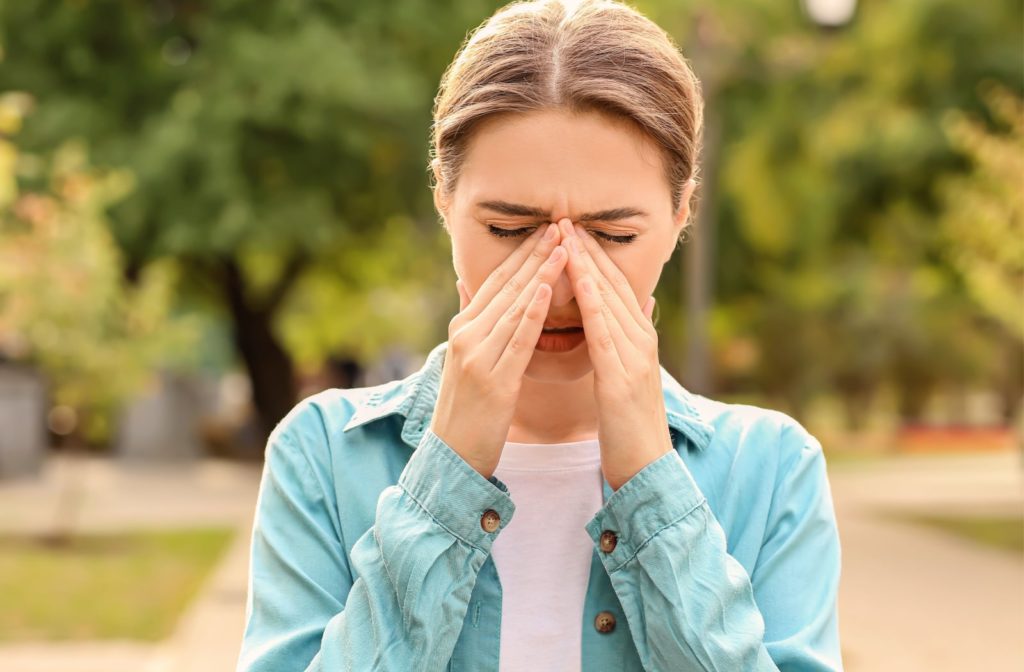More than 100 million Americans experience allergies every year. That’s a lot of people with runny noses, itchy skin, and scratchy throats. While allergies come in many shapes and symptoms, eye allergies cause itching, burning, and dry eyes.
Of course, allergies aren’t the only thing that can cause dry eyes, but knowing the source of the problem is the first step in finding a solution. Your optometrist can help you track your symptoms and watch for issues, but eye care starts at home.
What Are Allergies?
Allergies are your immune system overreacting to a typically harmless substance called an allergen. There are many types of allergies, including:
- Food allergies
- Skin allergies
- Dust allergies
- Insect sting allergies
- Pet allergies
- Drug allergies
- Hay fever
- Pollen allergies
- Latex allergies
- Mold allergies
You may have multiple allergies at once. When it comes to dry eyes, the culprit is most likely eye allergies, which are sometimes called allergic conjunctivitis. This allergy type will often appear alongside nasal allergies, but that doesn’t always happen.
Having an uncomfortable feeling in your eye is annoying and can bring on a new level of problems. Even if you know you’re experiencing eye allergies, you generally can’t immediately point the finger at the cause. Eye allergies can be the result of many different allergens, though you can divide them into these three triggers:
- Outdoor allergens: Pollen from trees, grass, or weeds.
- Indoor allergens: Mold, dust mites, pet dander.
- Chemical irritants: Cigarette smoke, diesel exhaust, perfume.
What is Dry Eye?
Dry eyes happen when your eyes don’t produce enough tears. They aren’t just water. They’re made up of three essential layers:
- The outer oily layer keeps the tear smooth and prevents it from evaporating.
- The watery middle layer hydrates the eye and keeps out harmful bacteria.
- The inner mucus layer sticks the tear to your eye.
Together these layers form the tear film that keeps your eye healthy and safe. But, if something disrupts the glands that make these layers, you’ve got dry eyes. Something like, for example, allergens.
Symptoms of dry eyes include:
- Burning, irritated, or scratchy eyes
- Red eyes
- Blurry vision
- Light sensitivity
- Stringy mucus discharge
- Excessive tear production as your eyes attempt to combat the dryness
Allergies aren’t the only cause of dry eyes. You could have a blockage in the meibomian glands that create the tear film’s outer layer, a medication reaction, or simply not blinking enough.

Allergies and Dry Eyes
Allergens don’t just irritate your eye as a speck of dust would. Instead, they cause the cells in your eyes to release histamine. Histamine is an essential chemical in your body, and it has its uses, but during an allergic reaction, it can cause inflammation.
Depending on where the reaction takes place, you may experience any number of symptoms, such as itchiness, flushing, or a narrowing of your airways.
For eye allergies, this inflammation can cause your eyelids to swell, which can block the lacrimal glands that produce healthy tears. Without tears, your eyes can become dry.
Dry eyes aren’t the only symptoms of eye allergies. You may also notice the following:
- Burning or irritation
- Itchiness
- Eyelid swelling
- Excessive tearing
- Light sensitivity
- Redness
You may also scratch your eyes without even thinking about it, worsening already present dry eye symptoms or potentially damaging the front of your eye.
Can Antihistamines Cause Dry Eyes?
The standard treatment for allergies is antihistamines. They’re excellent for helping with runny noses, sneezing, or itchiness caused by your body releasing histamines. However, antihistamines may also reduce tear production.
This reduction may be fine for many people. Still, antihistamines could be the tipping point into irritation and pain if you already have dry eyes—especially if it’s undiagnosed. Hydrating eyedrops might help hydrate your eyes in response, but you may need to ask your doctor for an alternative allergy treatment.
Treating Dry Eyes from Allergies
If allergies are causing your dry eyes, you’ll want to focus on avoiding those allergens. Prevention is better than treatment, so once you know your trigger, you can prevent allergies wherever you find them.
Here are some tips on reducing your exposure:
- Avoid being outdoors at peak pollen times, usually mid-morning and early evening.
- Protect your eyes with some stylish wraparound sunglasses.
- Allergy-causing dust mites are common in the bedroom, so keep your sheets and use mite-proof bedding.
- Keep the humidity in your home low to prevent mold growth, but not so low you’re drying out your eyes.
- Wash your hands after petting animals.
- Avoid rubbing your eyes.
If you’re already dealing with an eye allergy reaction, focus on relieving symptoms until the allergies fade. This relief can include the following:
- Using artificial tears.
- Taking omega-3 supplements.
- Using a warm compress to break down blockages in your oil glands.
- Remembering to blink regularly, especially while working on a screen.
Advanced Dry Eye Treatments
Don’t let dry eyes ruin your day. The Eye Care Team is experienced with diagnosing the source of dry eye symptoms and finding the best solution we can.
If you’re tired of fighting the urge to itch your dry eyes, book an eye exam at either of our two convenient locations in Washington and begin your journey to relief.



